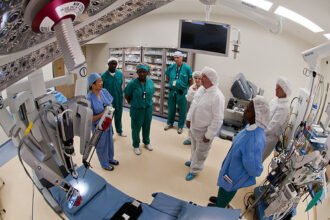The environmental impact of modern-day culture has reached an unsustainable point. Individuals, governments, and corporations are all working to reduce their carbon footprint. However, some estimates suggest that 8% of greenhouse emissions in the U.S. are generated from healthcare-related activities. It’s clear that the healthcare industry needs to reduce its environmental impact. But how can healthcare workers and administrators take practical action to reduce their carbon footprint?
Reduce, reuse and recycle office material
The old adage of “reduce, reuse and recycle” is as true for the office as it is at home. Healthcare facilities use an intimidatingly large amount of office supplies in a single day. Voluminous patient records are continually and redundantly printed out. Instructions for various tasks are often printed multiple times without any real need. And this overuse extends to almost every aspect of a healthcare facility’s style of operation.
The easiest change healthcare facilities can make is to simply switch to recycled paper. Additionally, employees should be reminded to recycle office supplies when possible. Along with this, it’s important to remind people to only print out what’s actually needed. If only one page of a patient’s history is needed, then only one page should be printed.
Reducing waste when eating
Hospital cafeterias are often immense. And every cafeteria is filled with areas which can benefit from a more waste focused outlook. The same is even true for areas within smaller healthcare facilities.
The first thing to consider is how much waste is generated with a single meal. People often throw away a large amount of waste every time they sit down to eat. When possible, people should try to avoid disposable eating utensils. It’s a little extra work to bring along a metal fork, knife, and spoon to work. However, this will become a habit faster than one might imagine. Of course, larger environments will often give people the opportunity to choose between plastic and metal eating utensils. In these cases, one would simply be able to choose the metal option.
Coffee is often another source of waste in healthcare environments. The often odd and frequently shuffled hours tends to result in people drinking a lot of coffee. Now imagine just how much waste is generated when most people are using disposable cups. Simply bringing a thermos or mug to use for coffee can make a significant impact on one’s carbon footprint. On an administrative level, a simple push to remind employees of that fact can make a huge difference as well.
Reduce meat consumption
Most healthcare facilities urge patients to reduce the amount of meat they consume. However, the people offering the advice don’t always follow it. If they did so, the overall environmental footprint of the facility would be dramatically improved. Meat requires far more work to get to one’s table than vegetables, fruits, nuts, and grains. Farmers essentially need to first grow and harvest plants before then feeding it to their livestock. Then they require significant time to grow into adulthood and eventually end up on one’s plate.
Going vegan would make a huge difference in sidestepping that process. However, people don’t need to make such a huge change to help reduce resource consumption. Even avoiding meat for a single day can make a big difference over the course of a lifetime. Hospital administrators, in particular, should consider encouraging a meat-free day where meal plans emphasize plant based alternatives.
Use alternate means of travel for short distances
People often forget that one doesn’t necessarily have to drive everywhere. It’s important to consider whether there’s a need to drive at all when looking at shorter routes. Very short distances are often faster when done on foot rather than in a car. And bikes are often a nice compromise when looking at slightly longer routes.
Encourage the use of electric vehicles
Healthcare workers spend a lot of time driving to and from work. It’s quite common for people in healthcare to have far more travel demands than the national average. All of this means that reducing gas consumption among healthcare workers will make a huge difference over time. One of the best ways to reduce gas expenditure is by switching to an electric vehicle.
People are often reluctant to make the switch to electric solely out of convenience. People working in facilities that don’t offer EV charging stations are less likely to consider electric cars. Conversely, making charging stations available at a healthcare facility can help encourage people to make the change. Administrators are in a position to help push people toward a more environmentally friendly car by installing some charging stations for their workplace.






